Mental Health Nursing: Personal Reflections and Career Goals
VerifiedAdded on 2023/01/23
|5
|1091
|60
Essay
AI Summary
This essay reflects on a nursing student's decision to specialize in mental health nursing, driven by a desire to assist individuals facing mental illness and the challenges they and their families encounter. The student details the challenges people with mental disorders face, including discrimination, educational impacts, vulnerability to health risks, and economic burdens. The essay also discusses the student's clinical placement experience, where they overcame initial fears and developed empathy, basic counseling skills, and an understanding of the importance of communication and hope in patient care. The student highlights the value of values-based and recovery-focused mental health practice, emphasizing the importance of creating awareness and building trust. Ultimately, the student looks forward to honing their skills and contributing to the field of mental health nursing.
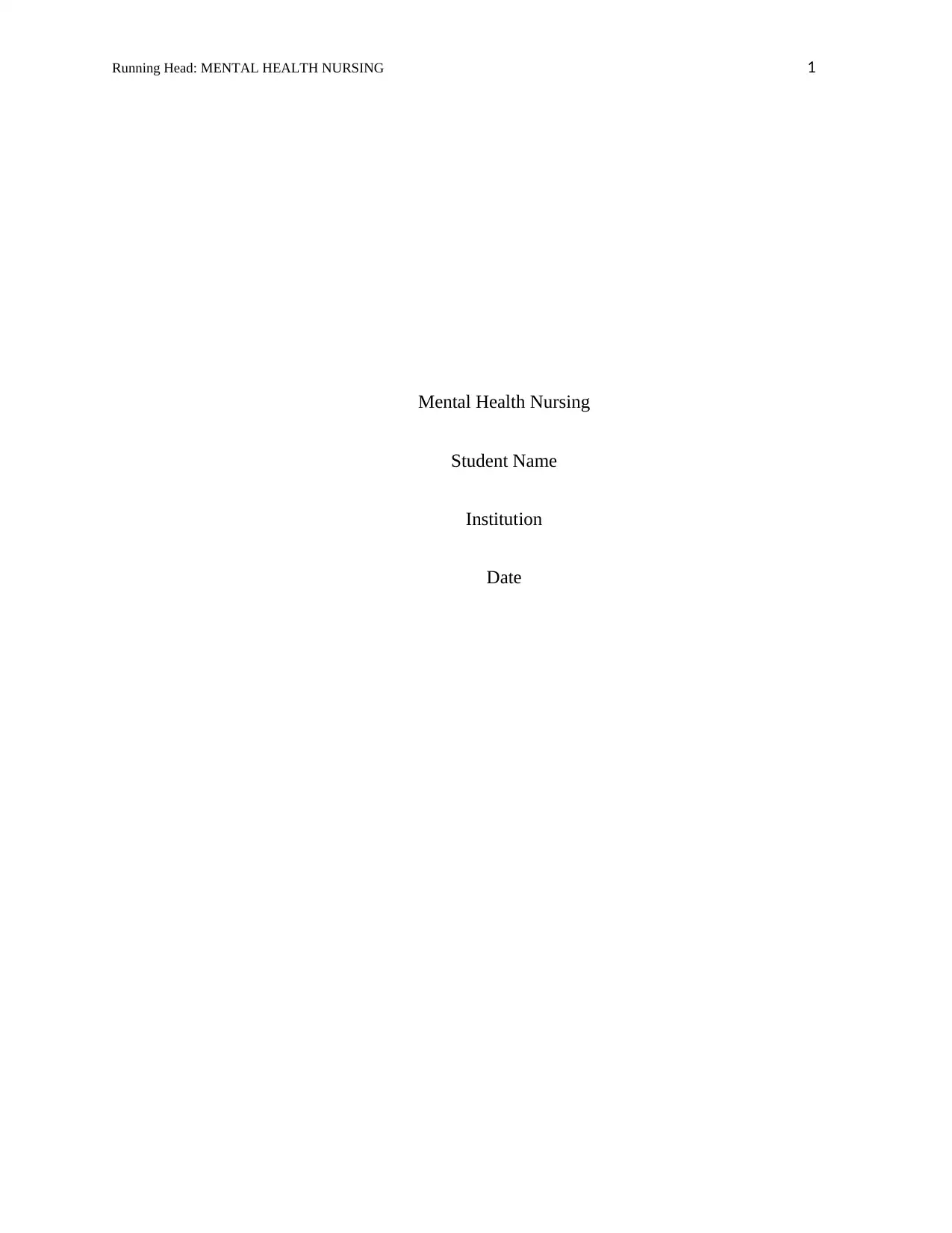
Running Head: MENTAL HEALTH NURSING 1
Mental Health Nursing
Student Name
Institution
Date
Mental Health Nursing
Student Name
Institution
Date
Paraphrase This Document
Need a fresh take? Get an instant paraphrase of this document with our AI Paraphraser
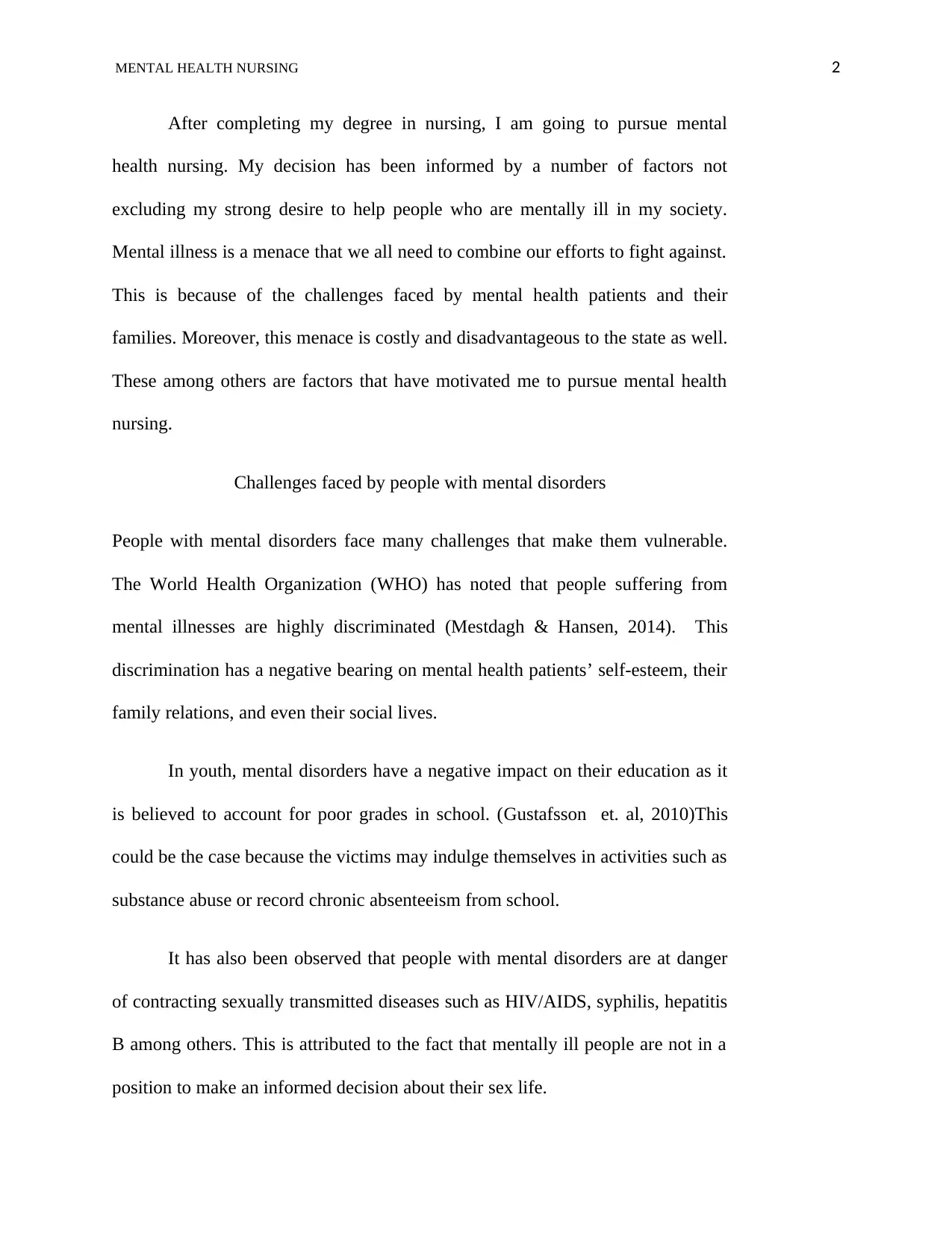
MENTAL HEALTH NURSING 2
After completing my degree in nursing, I am going to pursue mental
health nursing. My decision has been informed by a number of factors not
excluding my strong desire to help people who are mentally ill in my society.
Mental illness is a menace that we all need to combine our efforts to fight against.
This is because of the challenges faced by mental health patients and their
families. Moreover, this menace is costly and disadvantageous to the state as well.
These among others are factors that have motivated me to pursue mental health
nursing.
Challenges faced by people with mental disorders
People with mental disorders face many challenges that make them vulnerable.
The World Health Organization (WHO) has noted that people suffering from
mental illnesses are highly discriminated (Mestdagh & Hansen, 2014). This
discrimination has a negative bearing on mental health patients’ self-esteem, their
family relations, and even their social lives.
In youth, mental disorders have a negative impact on their education as it
is believed to account for poor grades in school. (Gustafsson et. al, 2010)This
could be the case because the victims may indulge themselves in activities such as
substance abuse or record chronic absenteeism from school.
It has also been observed that people with mental disorders are at danger
of contracting sexually transmitted diseases such as HIV/AIDS, syphilis, hepatitis
B among others. This is attributed to the fact that mentally ill people are not in a
position to make an informed decision about their sex life.
After completing my degree in nursing, I am going to pursue mental
health nursing. My decision has been informed by a number of factors not
excluding my strong desire to help people who are mentally ill in my society.
Mental illness is a menace that we all need to combine our efforts to fight against.
This is because of the challenges faced by mental health patients and their
families. Moreover, this menace is costly and disadvantageous to the state as well.
These among others are factors that have motivated me to pursue mental health
nursing.
Challenges faced by people with mental disorders
People with mental disorders face many challenges that make them vulnerable.
The World Health Organization (WHO) has noted that people suffering from
mental illnesses are highly discriminated (Mestdagh & Hansen, 2014). This
discrimination has a negative bearing on mental health patients’ self-esteem, their
family relations, and even their social lives.
In youth, mental disorders have a negative impact on their education as it
is believed to account for poor grades in school. (Gustafsson et. al, 2010)This
could be the case because the victims may indulge themselves in activities such as
substance abuse or record chronic absenteeism from school.
It has also been observed that people with mental disorders are at danger
of contracting sexually transmitted diseases such as HIV/AIDS, syphilis, hepatitis
B among others. This is attributed to the fact that mentally ill people are not in a
position to make an informed decision about their sex life.
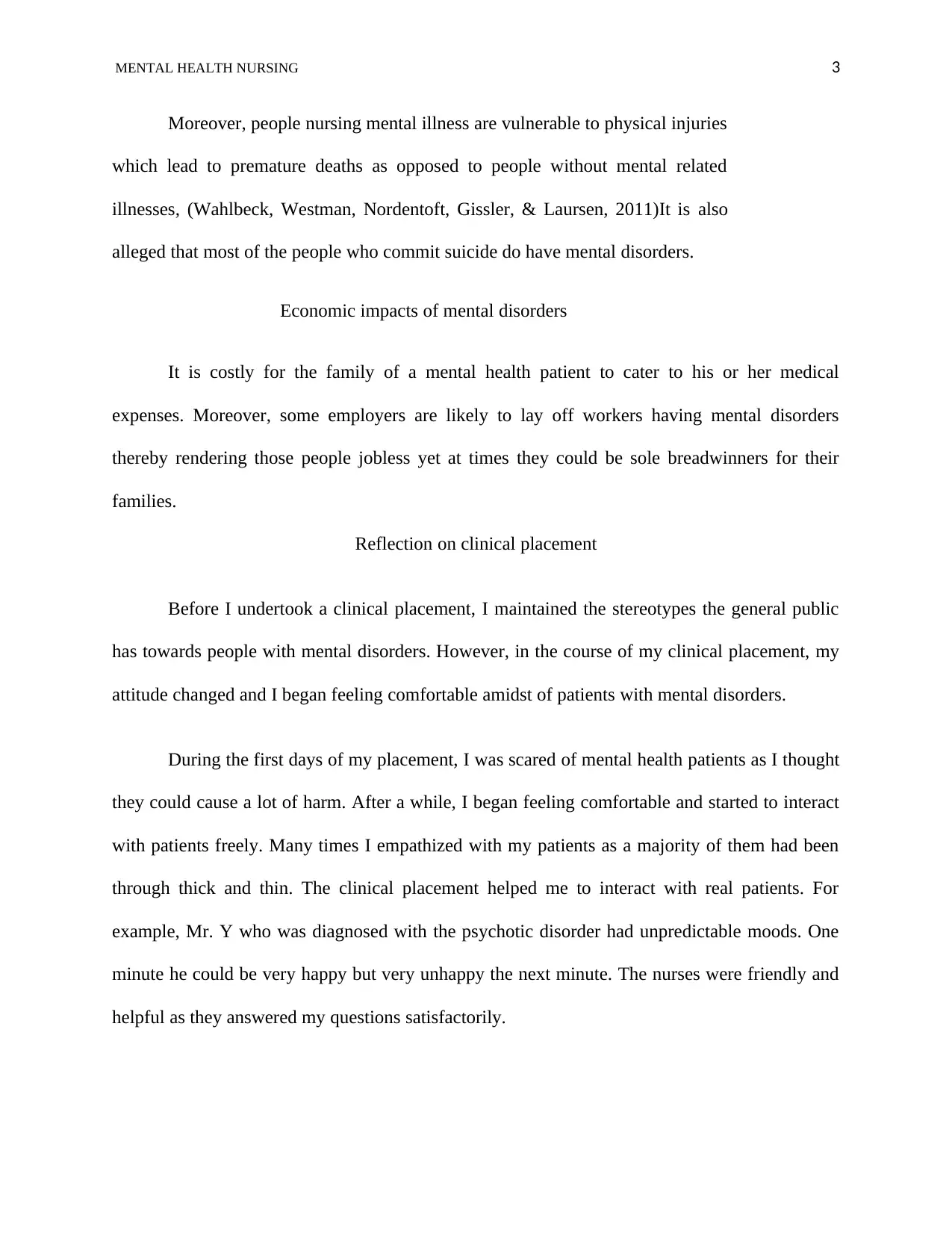
MENTAL HEALTH NURSING 3
Moreover, people nursing mental illness are vulnerable to physical injuries
which lead to premature deaths as opposed to people without mental related
illnesses, (Wahlbeck, Westman, Nordentoft, Gissler, & Laursen, 2011)It is also
alleged that most of the people who commit suicide do have mental disorders.
Economic impacts of mental disorders
It is costly for the family of a mental health patient to cater to his or her medical
expenses. Moreover, some employers are likely to lay off workers having mental disorders
thereby rendering those people jobless yet at times they could be sole breadwinners for their
families.
Reflection on clinical placement
Before I undertook a clinical placement, I maintained the stereotypes the general public
has towards people with mental disorders. However, in the course of my clinical placement, my
attitude changed and I began feeling comfortable amidst of patients with mental disorders.
During the first days of my placement, I was scared of mental health patients as I thought
they could cause a lot of harm. After a while, I began feeling comfortable and started to interact
with patients freely. Many times I empathized with my patients as a majority of them had been
through thick and thin. The clinical placement helped me to interact with real patients. For
example, Mr. Y who was diagnosed with the psychotic disorder had unpredictable moods. One
minute he could be very happy but very unhappy the next minute. The nurses were friendly and
helpful as they answered my questions satisfactorily.
Moreover, people nursing mental illness are vulnerable to physical injuries
which lead to premature deaths as opposed to people without mental related
illnesses, (Wahlbeck, Westman, Nordentoft, Gissler, & Laursen, 2011)It is also
alleged that most of the people who commit suicide do have mental disorders.
Economic impacts of mental disorders
It is costly for the family of a mental health patient to cater to his or her medical
expenses. Moreover, some employers are likely to lay off workers having mental disorders
thereby rendering those people jobless yet at times they could be sole breadwinners for their
families.
Reflection on clinical placement
Before I undertook a clinical placement, I maintained the stereotypes the general public
has towards people with mental disorders. However, in the course of my clinical placement, my
attitude changed and I began feeling comfortable amidst of patients with mental disorders.
During the first days of my placement, I was scared of mental health patients as I thought
they could cause a lot of harm. After a while, I began feeling comfortable and started to interact
with patients freely. Many times I empathized with my patients as a majority of them had been
through thick and thin. The clinical placement helped me to interact with real patients. For
example, Mr. Y who was diagnosed with the psychotic disorder had unpredictable moods. One
minute he could be very happy but very unhappy the next minute. The nurses were friendly and
helpful as they answered my questions satisfactorily.
⊘ This is a preview!⊘
Do you want full access?
Subscribe today to unlock all pages.

Trusted by 1+ million students worldwide
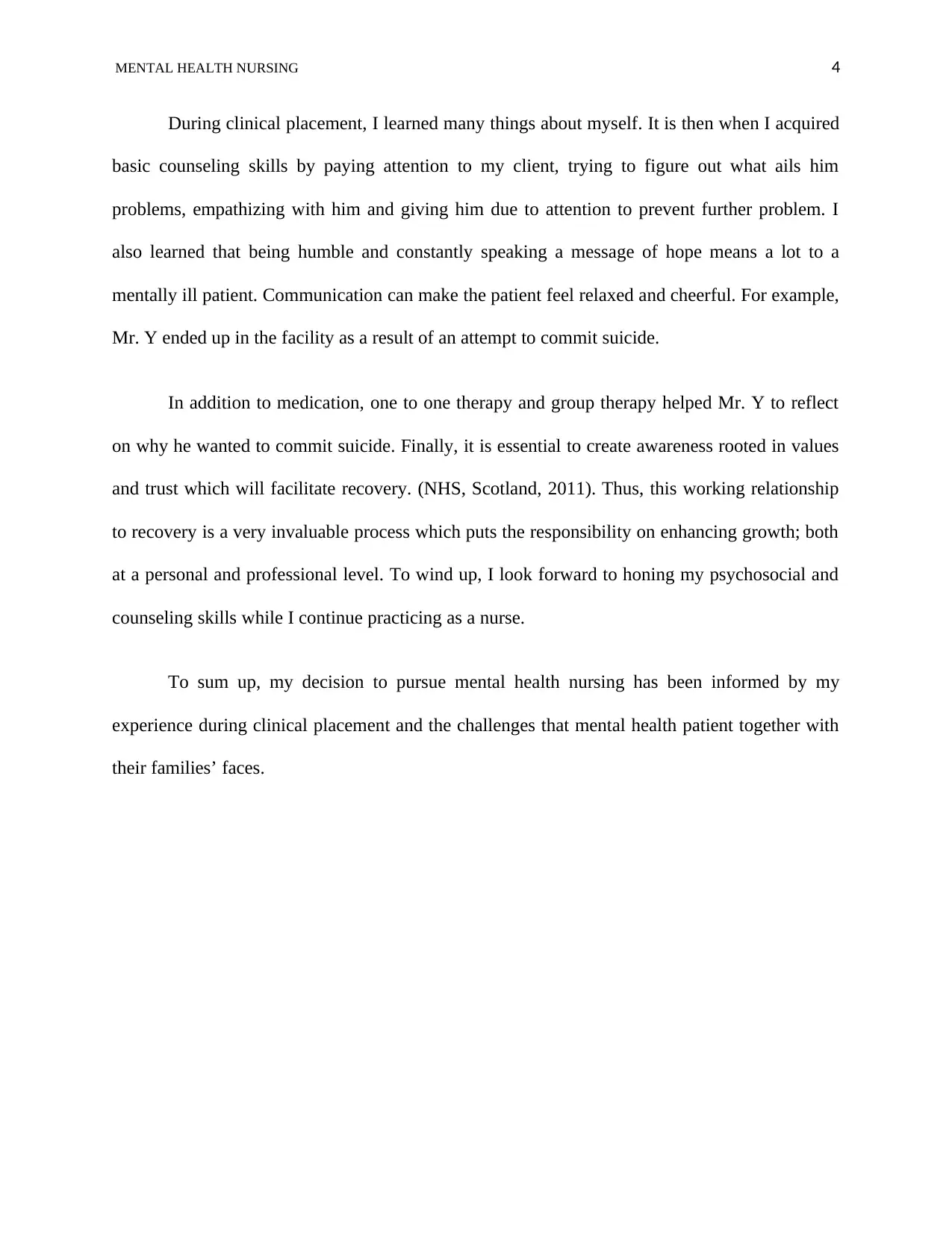
MENTAL HEALTH NURSING 4
During clinical placement, I learned many things about myself. It is then when I acquired
basic counseling skills by paying attention to my client, trying to figure out what ails him
problems, empathizing with him and giving him due to attention to prevent further problem. I
also learned that being humble and constantly speaking a message of hope means a lot to a
mentally ill patient. Communication can make the patient feel relaxed and cheerful. For example,
Mr. Y ended up in the facility as a result of an attempt to commit suicide.
In addition to medication, one to one therapy and group therapy helped Mr. Y to reflect
on why he wanted to commit suicide. Finally, it is essential to create awareness rooted in values
and trust which will facilitate recovery. (NHS, Scotland, 2011). Thus, this working relationship
to recovery is a very invaluable process which puts the responsibility on enhancing growth; both
at a personal and professional level. To wind up, I look forward to honing my psychosocial and
counseling skills while I continue practicing as a nurse.
To sum up, my decision to pursue mental health nursing has been informed by my
experience during clinical placement and the challenges that mental health patient together with
their families’ faces.
During clinical placement, I learned many things about myself. It is then when I acquired
basic counseling skills by paying attention to my client, trying to figure out what ails him
problems, empathizing with him and giving him due to attention to prevent further problem. I
also learned that being humble and constantly speaking a message of hope means a lot to a
mentally ill patient. Communication can make the patient feel relaxed and cheerful. For example,
Mr. Y ended up in the facility as a result of an attempt to commit suicide.
In addition to medication, one to one therapy and group therapy helped Mr. Y to reflect
on why he wanted to commit suicide. Finally, it is essential to create awareness rooted in values
and trust which will facilitate recovery. (NHS, Scotland, 2011). Thus, this working relationship
to recovery is a very invaluable process which puts the responsibility on enhancing growth; both
at a personal and professional level. To wind up, I look forward to honing my psychosocial and
counseling skills while I continue practicing as a nurse.
To sum up, my decision to pursue mental health nursing has been informed by my
experience during clinical placement and the challenges that mental health patient together with
their families’ faces.
Paraphrase This Document
Need a fresh take? Get an instant paraphrase of this document with our AI Paraphraser
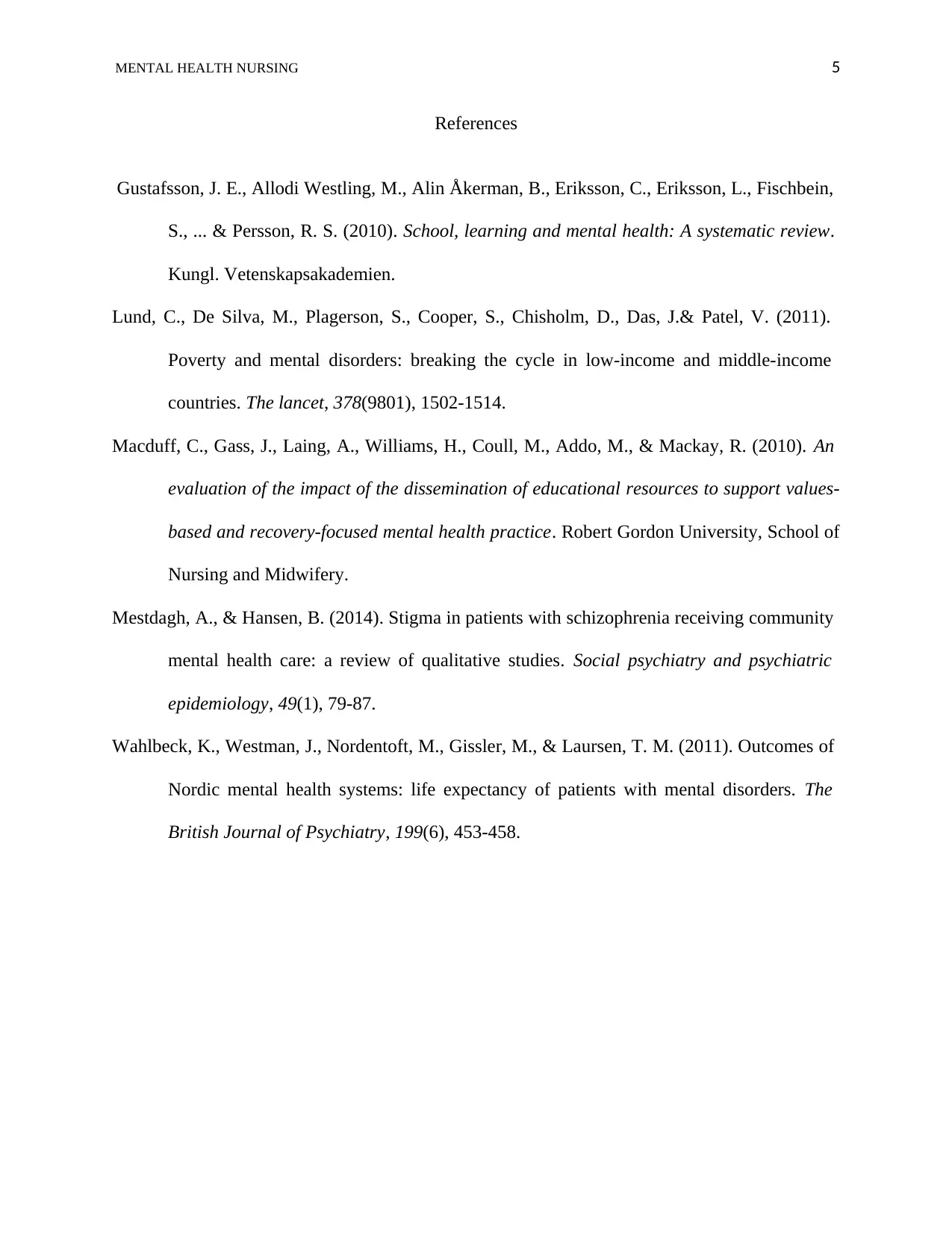
MENTAL HEALTH NURSING 5
References
Gustafsson, J. E., Allodi Westling, M., Alin Åkerman, B., Eriksson, C., Eriksson, L., Fischbein,
S., ... & Persson, R. S. (2010). School, learning and mental health: A systematic review.
Kungl. Vetenskapsakademien.
Lund, C., De Silva, M., Plagerson, S., Cooper, S., Chisholm, D., Das, J.& Patel, V. (2011).
Poverty and mental disorders: breaking the cycle in low-income and middle-income
countries. The lancet, 378(9801), 1502-1514.
Macduff, C., Gass, J., Laing, A., Williams, H., Coull, M., Addo, M., & Mackay, R. (2010). An
evaluation of the impact of the dissemination of educational resources to support values-
based and recovery-focused mental health practice. Robert Gordon University, School of
Nursing and Midwifery.
Mestdagh, A., & Hansen, B. (2014). Stigma in patients with schizophrenia receiving community
mental health care: a review of qualitative studies. Social psychiatry and psychiatric
epidemiology, 49(1), 79-87.
Wahlbeck, K., Westman, J., Nordentoft, M., Gissler, M., & Laursen, T. M. (2011). Outcomes of
Nordic mental health systems: life expectancy of patients with mental disorders. The
British Journal of Psychiatry, 199(6), 453-458.
References
Gustafsson, J. E., Allodi Westling, M., Alin Åkerman, B., Eriksson, C., Eriksson, L., Fischbein,
S., ... & Persson, R. S. (2010). School, learning and mental health: A systematic review.
Kungl. Vetenskapsakademien.
Lund, C., De Silva, M., Plagerson, S., Cooper, S., Chisholm, D., Das, J.& Patel, V. (2011).
Poverty and mental disorders: breaking the cycle in low-income and middle-income
countries. The lancet, 378(9801), 1502-1514.
Macduff, C., Gass, J., Laing, A., Williams, H., Coull, M., Addo, M., & Mackay, R. (2010). An
evaluation of the impact of the dissemination of educational resources to support values-
based and recovery-focused mental health practice. Robert Gordon University, School of
Nursing and Midwifery.
Mestdagh, A., & Hansen, B. (2014). Stigma in patients with schizophrenia receiving community
mental health care: a review of qualitative studies. Social psychiatry and psychiatric
epidemiology, 49(1), 79-87.
Wahlbeck, K., Westman, J., Nordentoft, M., Gissler, M., & Laursen, T. M. (2011). Outcomes of
Nordic mental health systems: life expectancy of patients with mental disorders. The
British Journal of Psychiatry, 199(6), 453-458.
1 out of 5
Related Documents
Your All-in-One AI-Powered Toolkit for Academic Success.
+13062052269
info@desklib.com
Available 24*7 on WhatsApp / Email
![[object Object]](/_next/static/media/star-bottom.7253800d.svg)
Unlock your academic potential
Copyright © 2020–2026 A2Z Services. All Rights Reserved. Developed and managed by ZUCOL.




